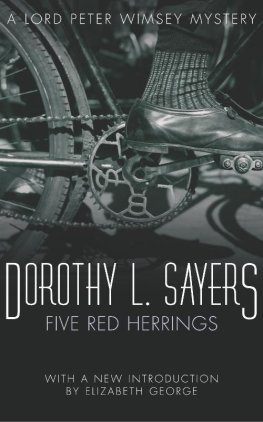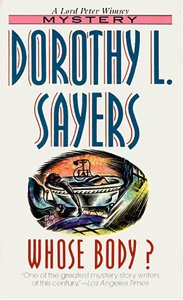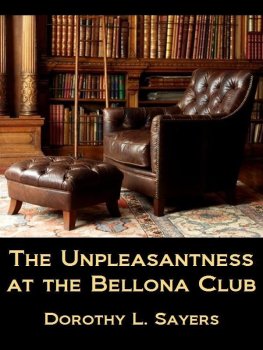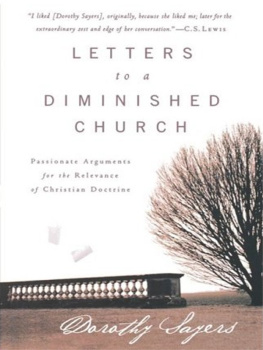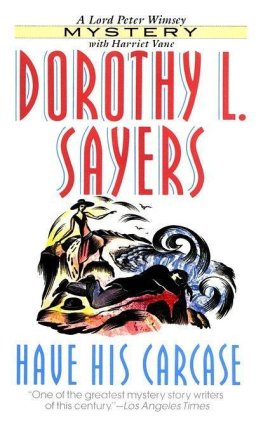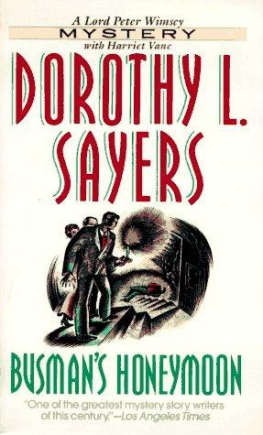Dorothy Sayers - Strong Poison
Here you can read online Dorothy Sayers - Strong Poison full text of the book (entire story) in english for free. Download pdf and epub, get meaning, cover and reviews about this ebook. genre: Detective and thriller. Description of the work, (preface) as well as reviews are available. Best literature library LitArk.com created for fans of good reading and offers a wide selection of genres:
Romance novel
Science fiction
Adventure
Detective
Science
History
Home and family
Prose
Art
Politics
Computer
Non-fiction
Religion
Business
Children
Humor
Choose a favorite category and find really read worthwhile books. Enjoy immersion in the world of imagination, feel the emotions of the characters or learn something new for yourself, make an fascinating discovery.

- Book:Strong Poison
- Author:
- Genre:
- Rating:4 / 5
- Favourites:Add to favourites
- Your mark:
- 80
- 1
- 2
- 3
- 4
- 5
Strong Poison: summary, description and annotation
We offer to read an annotation, description, summary or preface (depends on what the author of the book "Strong Poison" wrote himself). If you haven't found the necessary information about the book — write in the comments, we will try to find it.
Strong Poison — read online for free the complete book (whole text) full work
Below is the text of the book, divided by pages. System saving the place of the last page read, allows you to conveniently read the book "Strong Poison" online for free, without having to search again every time where you left off. Put a bookmark, and you can go to the page where you finished reading at any time.
Font size:
Interval:
Bookmark:

Dorothy L. Sayers
Strong Poison
The sixth book in the Peter Wimsey series, 1930
Where gat ye your dinner, Lord Rendal, my son?
Where gat ye your dinner, my handsome young man?
- O I dined with my sweetheart, Mother; make my bed soon,
For Im sick to the heart and I fain wad lie down.
O that was strong poison, Lord Rendal, my son,
O that was strong poison, my handsome young man,
- O yes, I am poisoned, Mother; make my bed soon,
For Im sick to the heart, and I fain wad lie down.
Old Ballad
CHAPTER I
There were crimson roses on the bench; they looked like splashes of blood.
The judge was an old man; so old, he seemed to have outlived time and change and death. His parrot-face and parrot voice were dry, like his old, heavily-veined hands. His scarlet robe clashed harshly with the crimson of the roses. He had sat for three days in the stuffy court, but he showed no sign of fatigue.
He did not look at the prisoner as he gathered his notes into a neat sheaf and turned to address the jury, but the prisoner looked at him. Her eyes, like dark smudges under the heavy square brows, seemed equally without fear and without hope. They waited.
Members of the jury -
The patient old eyes seemed to sum them up and take stock of their united intelligence. Three respectable tradesmen a tall, argumentative one, a stout, embarrassed one with a drooping moustache, and an unhappy one with a bad cold; a director of a large company, anxious not to waste valuable time; a publican, incongruously cheerful; two youngish men of the artisan class; a nondescript, elderly man, of educated appearance, who might have been anything: an artist with a red beard disguising a weak chin; three women an elderly spinster, a stout capable woman who kept a sweet-shop, and a harassed wife and mother whose thoughts seemed to be continually straying to her abandoned hearth.
Members of the jury you have listened with great patience and attention to the evidence in this very distressing case, and it is now my duty to sum up the facts and arguments which have been put before you by the learned Attorney General and by the learned Counsel for the Defence, and to put them in order as clearly as possible, so as to help you in forming your decision.
But first of all, perhaps I ought to say a few words with regard to that decision itself. You know, I am sure, that it is a great principle of English law that every accused person is held to be innocent unless and until he is proved otherwise. It is not necessary for him, or her, to prove innocence; it is, in the modern slang phrase, up to the Crown to prove guilt, and unless you are quite satisfied that the Crown has done this beyond all reasonable doubt, it is your duty to return a verdict of Not Guilty. That does not necessarily mean that the prisoner has established her innocence by proof; it simply means that the Crown has failed to produce in your minds an undoubted conviction of her guilt.
Salcombe Hardy, lifting his drowned violet eyes for a moment from his reporters note-book, scribbled two words on a slip of paper and pushed them over to Waffles Newton. Judge hostile. Waffles nodded. They were old hounds on this blood-trail.
The judge creaked on.
You may perhaps wish to hear from me exactly what is meant by those words reasonable doubt. They mean, just so much doubt as you might have in everyday life about an ordinary matter of business. This is a case of murder, and it might be natural for you to think that, in such a case, the words mean more than this. But that is not so. They do not mean that you must cast about for fantastical solutions of what seems to you plain and simple. They do not mean those nightmare doubts which sometimes torment us at four oclock in the morning when we have not slept very well. They only mean that the proof must be such as you would accept about a plain matter of buying and selling, or some such commonplace transaction. You must not strain your belief in favour of the prisoner any more, of course, than you must accept proof of her guilt without the most careful scrutiny.
Having said just these few words, so that you may not feel too much overwhelmed by the heavy responsibility laid upon you by your duty to the State, I will now begin at the beginning and try to place the story that we have heard, as clearly as possible before you.
The case for the Crown is that the prisoner, Harriet Vane, murdered Philip Boyes by poisoning him with arsenic. I need not detain you by going through the proofs offered by Sir James Lubbock and the other doctors who have given evidence as to the cause of death. The Crown say he died of arsenical poisoning, and the defence do not dispute it. The evidence is, therefore, that the death was due to arsenic, and you must accept that as a fact. The only question that remains for you is whether, in fact, that arsenic was deliberately administered by the prisoner with intent to murder.
The deceased, Philip Boyes, was, as you have heard, a writer. He was thirty-six years old, and he had published five novels and a large number of essays and articles. All these literary works were of what is sometimes called an advanced type. They preached doctrines which may seem to some of us immoral or seditious, such as atheism, and anarchy, and what is known as free love. His private life appears to have been conducted, for some time at least, in accordance with these doctrines.
At any rate, at some time in the year 1927, he became acquainted with Harriet Vane. They met in some of those artistic and literary circles where advanced topics are discussed, and after a time they became very friendly. The prisoner is also a novelist by profession, and it is very important to remember that she is a writer of so-called mystery or detective stories, such as deal with various ingenious methods of committing murder and other crimes.
You have heard the prisoner in the witness-box, and you have heard the various people who came forward to give evidence as to her character. You have been told that she is a young woman of great ability, brought up on strictly religious principles, who, through no fault of her own was left, at the age of twenty-three, to make her own way in the world. Since that time-and she is now twenty-nine years old-she has worked industriously to keep herself, and it is very much to her credit that she has, by her own exertions, made herself independent in a legitimate way, owing nothing to anybody and accepting help from no one.
She has told us herself, with great candour, how she became deeply attached to Philip Boyes, and how, for a considerable time, she held out against his persuasions to live with him in an irregular manner. There was, in fact, no reason at all why he should not have married her honourably; but apparently he represented himself as being conscientiously opposed to any formal marriage. You have the evidence of Sylvia Marriott and Eiluned Price that the prisoner was made very unhappy by this attitude which he chose to take up, and you have heard also that he was a very handsome and attractive man, whom any woman might have found it difficult to resist.
At any rate, in March of 1928, the prisoner, worn out, as she tells us, by his unceasing importunities, gave in, and consented to live on terms of intimacy with him, outside the bonds of marriage.
Now you may feel, and quite properly, that this was a very wrong thing to do. You may, after making all allowances for this young womans unprotected position, still feel that she was a person of unstable moral character. You will not be led away by the false glamour which certain writers contrive to throw about free love, into thinking that this was anything but an ordinary, vulgar act of misbehavior. Sir Impey Biggs, very rightly using all his great eloquence on behalf of his client, has painted this action of Harriet Vanes in very rosy colours; he has spoken of unselfish sacrifice and self-immolation, and has reminded you that, in such a situation, the woman always has to pay far more heavily than the man. You will not, I am sure, pay too much attention to this. You know quite well the difference between right and wrong in such matters, and you may think that, if Harriet Vane had not become to a certain extent corrupted by the unwholesome influences among which she lived, she would have shown a truer heroism by dismissing Philip Boyes from her society.
Next pageFont size:
Interval:
Bookmark:
Similar books «Strong Poison»
Look at similar books to Strong Poison. We have selected literature similar in name and meaning in the hope of providing readers with more options to find new, interesting, not yet read works.
Discussion, reviews of the book Strong Poison and just readers' own opinions. Leave your comments, write what you think about the work, its meaning or the main characters. Specify what exactly you liked and what you didn't like, and why you think so.

